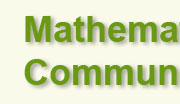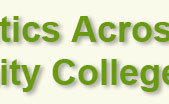MAC3 and Psychology
Figuring Out our Next President
Mathematics & Psychology. The College Learning Outcomes allow students to develop lifelong skills in each of the following ten areas:
- Communication
- Quantitative Analysis
- Critical/Creative Thinking and Scientific Reasoning
- Information Literacy
- Global, Cultural, and Historical Perspectives
- Personal, Civic, and Social Responsibility
- Ethical Thinking
- Computer and Technology Usage
- Aesthetic Appreciation
- Natural Systems and the Environment
Psychology and Statistics
As part of a MAC project at Columbia College, the faculty are Incorporating inferential statistics into everyday psychological life by using two assignments as added-value assignments. The assignments are being implemented into
Psychology 1 (General Psychology) & Math 2 (Elements of Statistics).
Quantitative Reasoning and Experiential Psychology:
This MAC course is an applied psychology course which emphasizes the understanding of the principles of effective human behavior and their application to the areas of personal awareness, interpersonal relations, communication, and work/career development. The students will learn the mathematical concepts necessary for understanding for individual assessment and impact, absolute risk and relative risk, and the Pearson Product Moment Correlation and Association.
Improving Quantitative Literacy through Analyzing Personality Test Data
This in class-exercise is to overcome student misperceptions about the "Bell Curve" and to
encourage critical thinking, particularly quantitative reasoning, in a very personally relevant context…the understanding of their own personality. As part of the study of trait approaches to personality, students will take an online, standardized personality test (the NEO-PRR). This exercise will guide students in an exploration of what their scores truly mean (as compared to what?), emphasizing the norming process. Class norms for the NEO-PRR will be developed and through this process students will gain an understanding of the normal distribution as well as the ability to calculate and interpret various measures of central tendency and variation.
|









